Geography 3.0, What It Is and What It Means predicts a new synthesis in the Knowledge Economy—fast forward to the past—Plus, the fire
 Noodles are largely driven by intuition and holistic mental doodling, and this one has been simmering a long time*. I believe that there is profound meaning in virtual and literal “mobility,” and I’ll explore its significance in terms geography and human relationships. Geography has always had a profound impact on how humans have lived and the organizations in which we have lived, and when its meaning shifts, our lives are transformed. This is of paramount importance because human relationships are currently transitioning from geography-based to interest-based. Many governments and businesses harbor business rules that assume geography-based relationships, and, unless they appreciate the shift to interest-based relationships, they will experience disruption’s spin cycle. Lose a turn. Don’t pass go ,^) Noodles are largely driven by intuition and holistic mental doodling, and this one has been simmering a long time*. I believe that there is profound meaning in virtual and literal “mobility,” and I’ll explore its significance in terms geography and human relationships. Geography has always had a profound impact on how humans have lived and the organizations in which we have lived, and when its meaning shifts, our lives are transformed. This is of paramount importance because human relationships are currently transitioning from geography-based to interest-based. Many governments and businesses harbor business rules that assume geography-based relationships, and, unless they appreciate the shift to interest-based relationships, they will experience disruption’s spin cycle. Lose a turn. Don’t pass go ,^)
Before exploring how these things will unfold in Part II, let’s review three geographies and four economies here in Part I…
[…]
IBM Drives Enterprise Adoption of Social Networks with New Enterprise Adaptability Practice offers reportage on the launch of IBM’s enterprise adaptability practice
Shades of Web 3.0—The Googlization of Knowledge Management—Resetting the Adoption Clocks
 Tuesday IBM announced a new services practice, “Enterprise Adaptability” services, which aims to help global companies realize a quantum leap in workforce agility and collaboration by facilitating their adoption of social networks and Web 2.0. As predicted in the Year in Review—2007, social networks and Web 2.0 are being embraced in the enterprise B2B arena this year, and this announcement shows that adoption is right on ahead of schedule. Enterprise 2.0 is reaching the mainstream, and companies that do not aggressively adopt enterprise 2.0 will experience serious competitive threats within three years. Tuesday IBM announced a new services practice, “Enterprise Adaptability” services, which aims to help global companies realize a quantum leap in workforce agility and collaboration by facilitating their adoption of social networks and Web 2.0. As predicted in the Year in Review—2007, social networks and Web 2.0 are being embraced in the enterprise B2B arena this year, and this announcement shows that adoption is right on ahead of schedule. Enterprise 2.0 is reaching the mainstream, and companies that do not aggressively adopt enterprise 2.0 will experience serious competitive threats within three years.
IBM’s announcement validates enterprise social networking, but more significant is their rationale for launching the practice: their clients are struggling with adjusting to the Knowledge Economy, globalization and decreasing margins, and Enterprise Adaptability prescribes collaboration and innovation to cure legendary agility gaps. As explained below, Enterprise Adaptability smells like breakthrough, although it’s barely out of the oven. To look behind the curtain, I caught up with […]
India Trade Minister Draws Chicago-India Parallels at Executives’ Club offers coverage of Shri Kamal Nath’s Chicago presentation. Key themes: new global economic architecture presages economic realignment and thinking beyond the obvious to tap emerging opportunities.
 Illinois leaders were addressed by His Excellency Shri Kamal Nath, Minister of Commerce and Industry, Republic of India. True to form, His Excellency struck chords of transformation, partnership, common interests and harmony at the lunch held in his honor at the University Club on 19 February 2008. Attending were Chicago Mayor Richard M. Daley, Mr. Rajinder Bedi, Managing Director of the Illinois Office of Trade and Investment, The Honorable Susan Schwab, U.S. Trade Representative, Craig S. Donohue, Chief Executive Officer, CME Group and John Estey, President & Chief Executive Officer, SC Electric Company. Illinois leaders were addressed by His Excellency Shri Kamal Nath, Minister of Commerce and Industry, Republic of India. True to form, His Excellency struck chords of transformation, partnership, common interests and harmony at the lunch held in his honor at the University Club on 19 February 2008. Attending were Chicago Mayor Richard M. Daley, Mr. Rajinder Bedi, Managing Director of the Illinois Office of Trade and Investment, The Honorable Susan Schwab, U.S. Trade Representative, Craig S. Donohue, Chief Executive Officer, CME Group and John Estey, President & Chief Executive Officer, SC Electric Company.
Reading between the lines, the U.S. and India stand at a significant turning point: India’s impressive economic growth is a significant element of the ongoing redistribution of global economic power—which holds excellent opportunities for U.S. businesses and workers that are looking for it.
[…]
U.S. Economy Due for Sideways Year—Special Effects by Presidential Election—Uncomfortable Long-term Questions Waiting in Wings
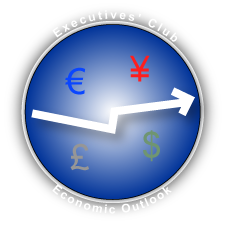 The Executives’ Club of Chicago assembled an all-star panel to give Midwest business leaders their guidance for various aspects of the U.S. economy in 2008. Diane Swonk, Chief Economist of Mesirow Financial and Robert “Bob” Froehlich, Chairman of the Investment Strategy Committee, Deutsche Asset Management returned, and the mystery panelist was Jack Ablin, Chief Investment Officer, Harris Private Bank. They broke out their respective crystal balls for 2008, along with comedic effects. The session was brilliantly moderated by Terry Savage, Financial Columnist of the Chicago Sun-Times who didn’t miss a beat and extracted specific predictions from panelists. The Executives’ Club of Chicago assembled an all-star panel to give Midwest business leaders their guidance for various aspects of the U.S. economy in 2008. Diane Swonk, Chief Economist of Mesirow Financial and Robert “Bob” Froehlich, Chairman of the Investment Strategy Committee, Deutsche Asset Management returned, and the mystery panelist was Jack Ablin, Chief Investment Officer, Harris Private Bank. They broke out their respective crystal balls for 2008, along with comedic effects. The session was brilliantly moderated by Terry Savage, Financial Columnist of the Chicago Sun-Times who didn’t miss a beat and extracted specific predictions from panelists.
Panelists agreed that the U.S. economy would struggle in 2008, but it would move mostly sideways, probably eking out a 1-2% gain for the year after an unsatisfying first half. All panelists predicted that the Dow would touch 14,000 sometime during the year. Froehlich again emphasized the importance of looking beyond the U.S. for investments. Swonk and Ablin were less outspoken but had high non-U.S. allocations in their recommended […]
Year in Review 2007—Editor’s Choice of the Global Human Capital Journal
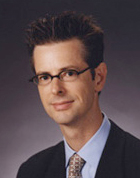 As I reflect on 2007 and create strategy for 2008, several macro-trends come into sharp relief, and I believe that some of them might be helpful to you as you conduct your own planning. As always, I focus on emerging phenomena because they are areas in which disruption and discontinuous change are acting on markets, thereby elevating threats and opportunities. Helping leaders to create strategy to manage the risk of unusual market developments is the focus of my consulting practice. As I reflect on 2007 and create strategy for 2008, several macro-trends come into sharp relief, and I believe that some of them might be helpful to you as you conduct your own planning. As always, I focus on emerging phenomena because they are areas in which disruption and discontinuous change are acting on markets, thereby elevating threats and opportunities. Helping leaders to create strategy to manage the risk of unusual market developments is the focus of my consulting practice.
In 2007 it became clear to me that we were entering a profound social transformation that would produce an unimaginable degree of change. Unlike the technology-precipitated change that I’ve been helping people with since the 1990s, technology is shifting to the background now, and pervasive social change is taking the stage. Look for disruption in all areas affected by how people connect, communicate, purchase and collaborate: business, politics, community and leisure. Moreover, these changes are completely global with all the variations that engenders.
I can’t tell […]
Edison as Mashup Artist: Combining Discipline, Process and Intuition
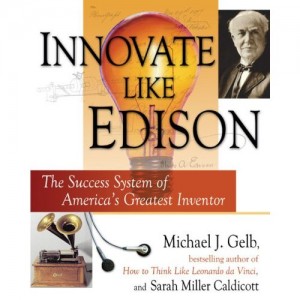 Innovate Like Edison is a must-read for anyone who wants to thrive in the “flat world.” Had it been written in the 20th century, the book would have been applicable to R&D leaders, and it would have been a nice-to-have for business and government leaders. Innovation was the place kicker on the team during the Industrial Economy because companies created value through efficiency (refining continuous processes), and innovation is about discontinuous processes. Innovate Like Edison is a must-read for anyone who wants to thrive in the “flat world.” Had it been written in the 20th century, the book would have been applicable to R&D leaders, and it would have been a nice-to-have for business and government leaders. Innovation was the place kicker on the team during the Industrial Economy because companies created value through efficiency (refining continuous processes), and innovation is about discontinuous processes.
In the 21st century Knowledge Economy, however, innovation is the linebacker. Customers merely expect world-class efficiency, but it rarely differentiates. Innovation is now a core competency at most levels of every organization.
The problem is, the authors explain, is that very few people are innovation literate, and they don’t know how to practice it practically. As I’ve written extensively, business innovation failures are over 95%, and most new products fail at high rates. We must reposition innovation as a linebacker, and that means understanding it differently and treating it differently.
[…]
Mashing up Edison and Weinberger wires together two thinkers that usually exist in different worlds, and reveals key facets of Knowledge Economy disruption.

By the way, Noodles represent a new kind of post, bits of thought that are unstructured and relatively brief. Many won’t even be split into “extended” articles. They are partially inspired by twitter.
Yesterday I heard David Weinberger (one of the Cluetrain authors; his new book is Everything is Miscellaneous) talk at Big Frontier, and the big insight I took away doesn’t sound like much but, peel the onion, and it’s quite profound. Knowledge is inherently social. We vet our thoughts by sharing them with other people. Interaction helps us to refine thoughts and coalesce them into knowledge by knocking off the rough edges, and we co-design knowledge by collaborating.
[…]
Caterpillar CEO Pitches Free Trade to Business Leaders at Executives’ Club asks whether the U.S. is at turning point with global economy in the balance—A lack of courage?
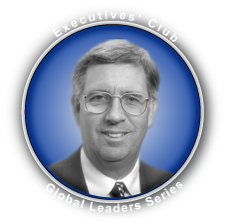 James W. Owens, Chairman and Chief Executive Officer of Caterpillar Inc., beseeched U.S. business and government leaders to find the courage to save free trade. The speaker at the Executives’ Club of Chicago’s Global Leaders Series, Owens addressed a packed house at the Hilton Chicago on 16 October 2007. His speech was immediately followed by the Club’s Technology Conference at which CIOs advised their peers on the emerging role of the CIO in the “networked economy 2.0.” James W. Owens, Chairman and Chief Executive Officer of Caterpillar Inc., beseeched U.S. business and government leaders to find the courage to save free trade. The speaker at the Executives’ Club of Chicago’s Global Leaders Series, Owens addressed a packed house at the Hilton Chicago on 16 October 2007. His speech was immediately followed by the Club’s Technology Conference at which CIOs advised their peers on the emerging role of the CIO in the “networked economy 2.0.”
A Ph.D. economist with extensive global management experience, Owens made a very convincing argument that the U.S. and the global economy are at a turning point. It is time for the U.S. to lead by example to assure the continuance of the free trade juggernaut that has produced so much wealth in the world. If it fails, the world stands before the prospect of sharply curtailed trade.
Following […]
The Rise of the Niche Will Transform the Mass Model—The UGM Threat Is the Opportunity
 The advertising industry is at a crossroads. It came of age during the Industrial Economy, and explosive growth coincided with the development of the mass media and the focus on “brand” TV and print advertising. Big media and advertising reflect Industrial Economy values and sensibilities: produce big numbers efficiently and innovate when necessary. Amortize existing investments. The problem is, Knowledge Economy customers want to be communicated with as individuals. Since advertising’s processes have been built with big numbers in mind, they are expensive, and the numbers don’t work when agencies try to address niches. The advertising industry is at a crossroads. It came of age during the Industrial Economy, and explosive growth coincided with the development of the mass media and the focus on “brand” TV and print advertising. Big media and advertising reflect Industrial Economy values and sensibilities: produce big numbers efficiently and innovate when necessary. Amortize existing investments. The problem is, Knowledge Economy customers want to be communicated with as individuals. Since advertising’s processes have been built with big numbers in mind, they are expensive, and the numbers don’t work when agencies try to address niches.
Efficiency in advertising has given rise to a value chain that is as heavy with inflexible infrastructure as the airlines’ hub and spoke system. Advertisers remain focused on “reach,” the number of eyeballs that view their messages (and respond when it’s measurable). That’s how advertising effectiveness is measured. Advertisers are resistant to changing this system, and that makes emerging technologies like mobile video and social networks of secondary interest to them. Meanwhile, innovators are developing technology and offerings to […]
Rebooting Kraft—CEO Outlines Growth Strategy clearly shows the innovation imperative: A Play in Two Acts, Starring the Consumer.
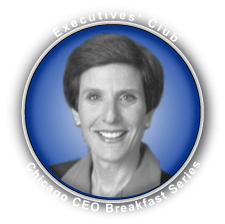 Irene B. Rosenfeld, Chairman & Chief Executive Officer of Kraft Foods, outlined her vision for relaunching Kraft at the Executives’ Club of Chicago’s Chicago CEO Breakfast on May 30, 2007 at the Mid-America Club. She was enthusiastic about the company’s second lease on life: having spun off of Altria this spring, the company is newly independent, and she was eager to share her plan to drive growth by addressing the “eye of the consumer.” Irene B. Rosenfeld, Chairman & Chief Executive Officer of Kraft Foods, outlined her vision for relaunching Kraft at the Executives’ Club of Chicago’s Chicago CEO Breakfast on May 30, 2007 at the Mid-America Club. She was enthusiastic about the company’s second lease on life: having spun off of Altria this spring, the company is newly independent, and she was eager to share her plan to drive growth by addressing the “eye of the consumer.”
Kraft Foods is the second largest food company in the world and the largest in North America. It has seven brands that produce revenue of over $1 billion and fifty that bring in over $100 million each. Central to her strategy is leveraging Kraft’s formidable brand portfolio and other economies of scale. Rosenfeld “came home to Kraft” about a year ago, having had highly visible leadership roles at the company in the past and the top job at Frito-Lay immediately prior.
[…]
|
|
 Noodles are largely driven by intuition and holistic mental doodling, and this one has been simmering a long time*. I believe that there is profound meaning in virtual and literal “mobility,” and I’ll explore its significance in terms geography and human relationships. Geography has always had a profound impact on how humans have lived and the organizations in which we have lived, and when its meaning shifts, our lives are transformed. This is of paramount importance because human relationships are currently transitioning from geography-based to interest-based. Many governments and businesses harbor business rules that assume geography-based relationships, and, unless they appreciate the shift to interest-based relationships, they will experience disruption’s spin cycle. Lose a turn. Don’t pass go ,^)
Noodles are largely driven by intuition and holistic mental doodling, and this one has been simmering a long time*. I believe that there is profound meaning in virtual and literal “mobility,” and I’ll explore its significance in terms geography and human relationships. Geography has always had a profound impact on how humans have lived and the organizations in which we have lived, and when its meaning shifts, our lives are transformed. This is of paramount importance because human relationships are currently transitioning from geography-based to interest-based. Many governments and businesses harbor business rules that assume geography-based relationships, and, unless they appreciate the shift to interest-based relationships, they will experience disruption’s spin cycle. Lose a turn. Don’t pass go ,^)
 Tuesday IBM announced a new services practice, “Enterprise Adaptability” services, which aims to help global companies realize a quantum leap in workforce agility and collaboration by facilitating their adoption of social networks and Web 2.0. As predicted in the Year in Review—2007, social networks and Web 2.0 are being embraced in the enterprise B2B arena this year, and this announcement shows that adoption is right on ahead of schedule. Enterprise 2.0 is reaching the mainstream, and companies that do not aggressively adopt enterprise 2.0 will experience serious competitive threats within three years.
Tuesday IBM announced a new services practice, “Enterprise Adaptability” services, which aims to help global companies realize a quantum leap in workforce agility and collaboration by facilitating their adoption of social networks and Web 2.0. As predicted in the Year in Review—2007, social networks and Web 2.0 are being embraced in the enterprise B2B arena this year, and this announcement shows that adoption is right on ahead of schedule. Enterprise 2.0 is reaching the mainstream, and companies that do not aggressively adopt enterprise 2.0 will experience serious competitive threats within three years. Illinois leaders were addressed by His Excellency Shri Kamal Nath, Minister of Commerce and Industry, Republic of India. True to form, His Excellency struck chords of transformation, partnership, common interests and harmony at the lunch held in his honor at the University Club on 19 February 2008. Attending were Chicago Mayor Richard M. Daley, Mr. Rajinder Bedi, Managing Director of the Illinois Office of Trade and Investment, The Honorable Susan Schwab, U.S. Trade Representative, Craig S. Donohue, Chief Executive Officer, CME Group and John Estey, President & Chief Executive Officer, SC Electric Company.
Illinois leaders were addressed by His Excellency Shri Kamal Nath, Minister of Commerce and Industry, Republic of India. True to form, His Excellency struck chords of transformation, partnership, common interests and harmony at the lunch held in his honor at the University Club on 19 February 2008. Attending were Chicago Mayor Richard M. Daley, Mr. Rajinder Bedi, Managing Director of the Illinois Office of Trade and Investment, The Honorable Susan Schwab, U.S. Trade Representative, Craig S. Donohue, Chief Executive Officer, CME Group and John Estey, President & Chief Executive Officer, SC Electric Company. The Executives’ Club of Chicago assembled an all-star panel to give Midwest business leaders their guidance for various aspects of the U.S. economy in 2008. Diane Swonk, Chief Economist of Mesirow Financial and Robert “Bob” Froehlich, Chairman of the Investment Strategy Committee, Deutsche Asset Management returned, and the mystery panelist was Jack Ablin, Chief Investment Officer, Harris Private Bank. They broke out their respective crystal balls for 2008, along with comedic effects. The session was brilliantly moderated by Terry Savage, Financial Columnist of the Chicago Sun-Times who didn’t miss a beat and extracted specific predictions from panelists.
The Executives’ Club of Chicago assembled an all-star panel to give Midwest business leaders their guidance for various aspects of the U.S. economy in 2008. Diane Swonk, Chief Economist of Mesirow Financial and Robert “Bob” Froehlich, Chairman of the Investment Strategy Committee, Deutsche Asset Management returned, and the mystery panelist was Jack Ablin, Chief Investment Officer, Harris Private Bank. They broke out their respective crystal balls for 2008, along with comedic effects. The session was brilliantly moderated by Terry Savage, Financial Columnist of the Chicago Sun-Times who didn’t miss a beat and extracted specific predictions from panelists. As I reflect on 2007 and create strategy for 2008, several macro-trends come into sharp relief, and I believe that some of them might be helpful to you as you conduct your own planning. As always, I focus on emerging phenomena because they are areas in which disruption and discontinuous change are acting on markets, thereby elevating threats and opportunities. Helping leaders to create strategy to manage the risk of unusual market developments is the focus of my consulting practice.
As I reflect on 2007 and create strategy for 2008, several macro-trends come into sharp relief, and I believe that some of them might be helpful to you as you conduct your own planning. As always, I focus on emerging phenomena because they are areas in which disruption and discontinuous change are acting on markets, thereby elevating threats and opportunities. Helping leaders to create strategy to manage the risk of unusual market developments is the focus of my consulting practice. Innovate Like Edison is a must-read for anyone who wants to thrive in the “flat world.” Had it been written in the 20th century, the book would have been applicable to R&D leaders, and it would have been a nice-to-have for business and government leaders. Innovation was the place kicker on the team during the Industrial Economy because companies created value through efficiency (refining continuous processes), and innovation is about discontinuous processes.
Innovate Like Edison is a must-read for anyone who wants to thrive in the “flat world.” Had it been written in the 20th century, the book would have been applicable to R&D leaders, and it would have been a nice-to-have for business and government leaders. Innovation was the place kicker on the team during the Industrial Economy because companies created value through efficiency (refining continuous processes), and innovation is about discontinuous processes. James W. Owens, Chairman and Chief Executive Officer of Caterpillar Inc., beseeched U.S. business and government leaders to find the courage to save free trade. The speaker at the Executives’ Club of Chicago’s Global Leaders Series, Owens addressed a packed house at the Hilton Chicago on 16 October 2007. His speech was immediately followed by the Club’s Technology Conference at which CIOs advised their peers on the emerging role of the CIO in the “networked economy 2.0.”
James W. Owens, Chairman and Chief Executive Officer of Caterpillar Inc., beseeched U.S. business and government leaders to find the courage to save free trade. The speaker at the Executives’ Club of Chicago’s Global Leaders Series, Owens addressed a packed house at the Hilton Chicago on 16 October 2007. His speech was immediately followed by the Club’s Technology Conference at which CIOs advised their peers on the emerging role of the CIO in the “networked economy 2.0.” The advertising industry is at a crossroads. It came of age during the Industrial Economy, and explosive growth coincided with the development of the mass media and the focus on “brand” TV and print advertising. Big media and advertising reflect Industrial Economy values and sensibilities: produce big numbers efficiently and innovate when necessary. Amortize existing investments. The problem is, Knowledge Economy customers want to be communicated with as individuals. Since advertising’s processes have been built with big numbers in mind, they are expensive, and the numbers don’t work when agencies try to address niches.
The advertising industry is at a crossroads. It came of age during the Industrial Economy, and explosive growth coincided with the development of the mass media and the focus on “brand” TV and print advertising. Big media and advertising reflect Industrial Economy values and sensibilities: produce big numbers efficiently and innovate when necessary. Amortize existing investments. The problem is, Knowledge Economy customers want to be communicated with as individuals. Since advertising’s processes have been built with big numbers in mind, they are expensive, and the numbers don’t work when agencies try to address niches. Irene B. Rosenfeld, Chairman & Chief Executive Officer of Kraft Foods, outlined her vision for relaunching Kraft at the Executives’ Club of Chicago’s Chicago CEO Breakfast on May 30, 2007 at the Mid-America Club. She was enthusiastic about the company’s second lease on life: having spun off of Altria this spring, the company is newly independent, and she was eager to share her plan to drive growth by addressing the “eye of the consumer.”
Irene B. Rosenfeld, Chairman & Chief Executive Officer of Kraft Foods, outlined her vision for relaunching Kraft at the Executives’ Club of Chicago’s Chicago CEO Breakfast on May 30, 2007 at the Mid-America Club. She was enthusiastic about the company’s second lease on life: having spun off of Altria this spring, the company is newly independent, and she was eager to share her plan to drive growth by addressing the “eye of the consumer.”